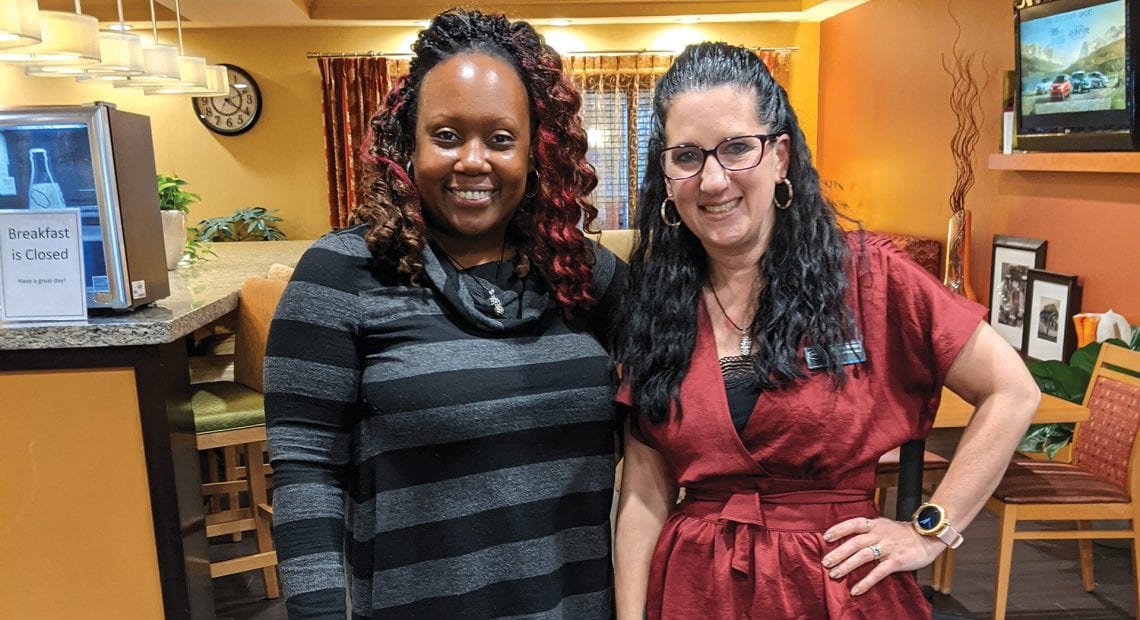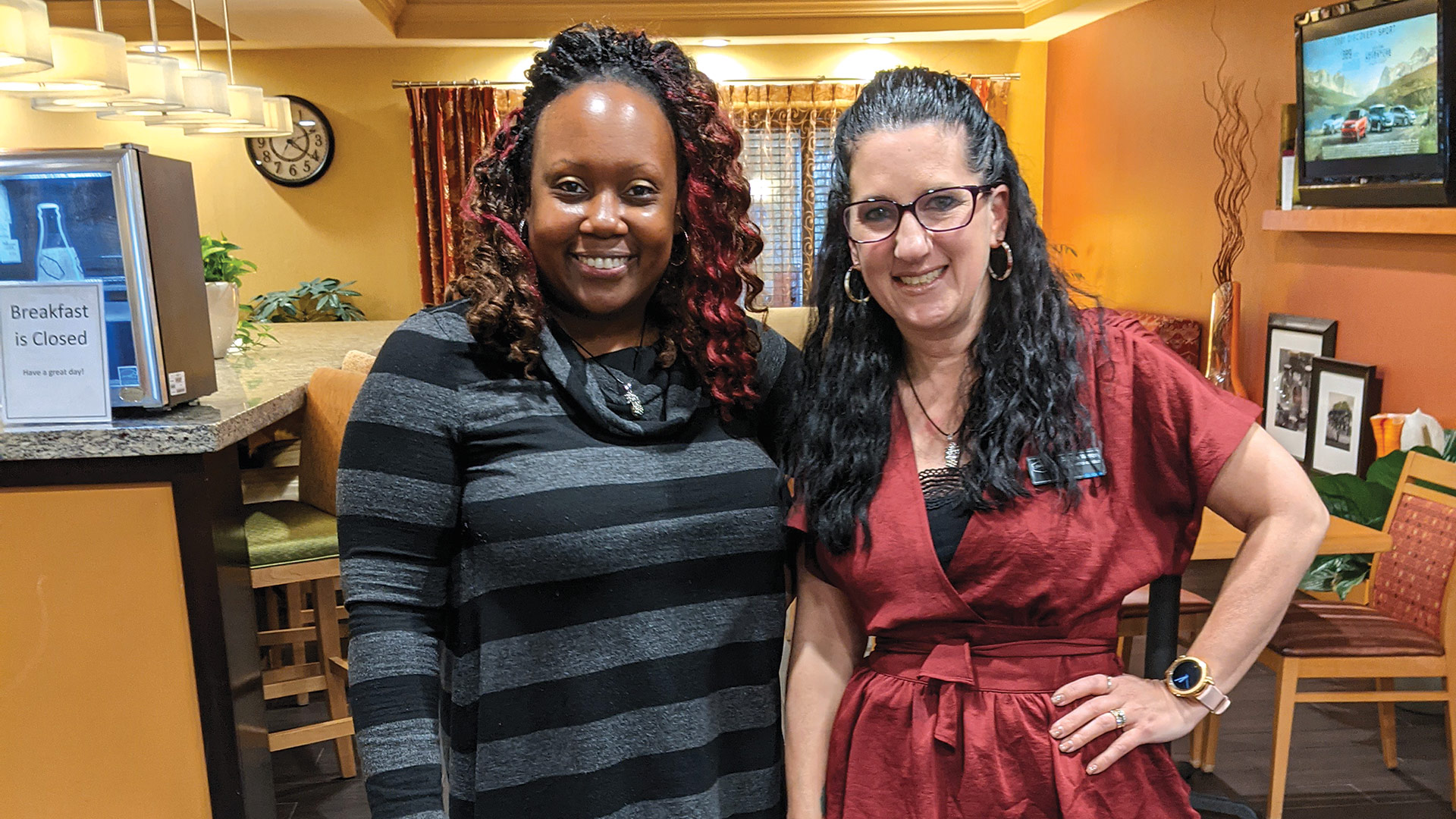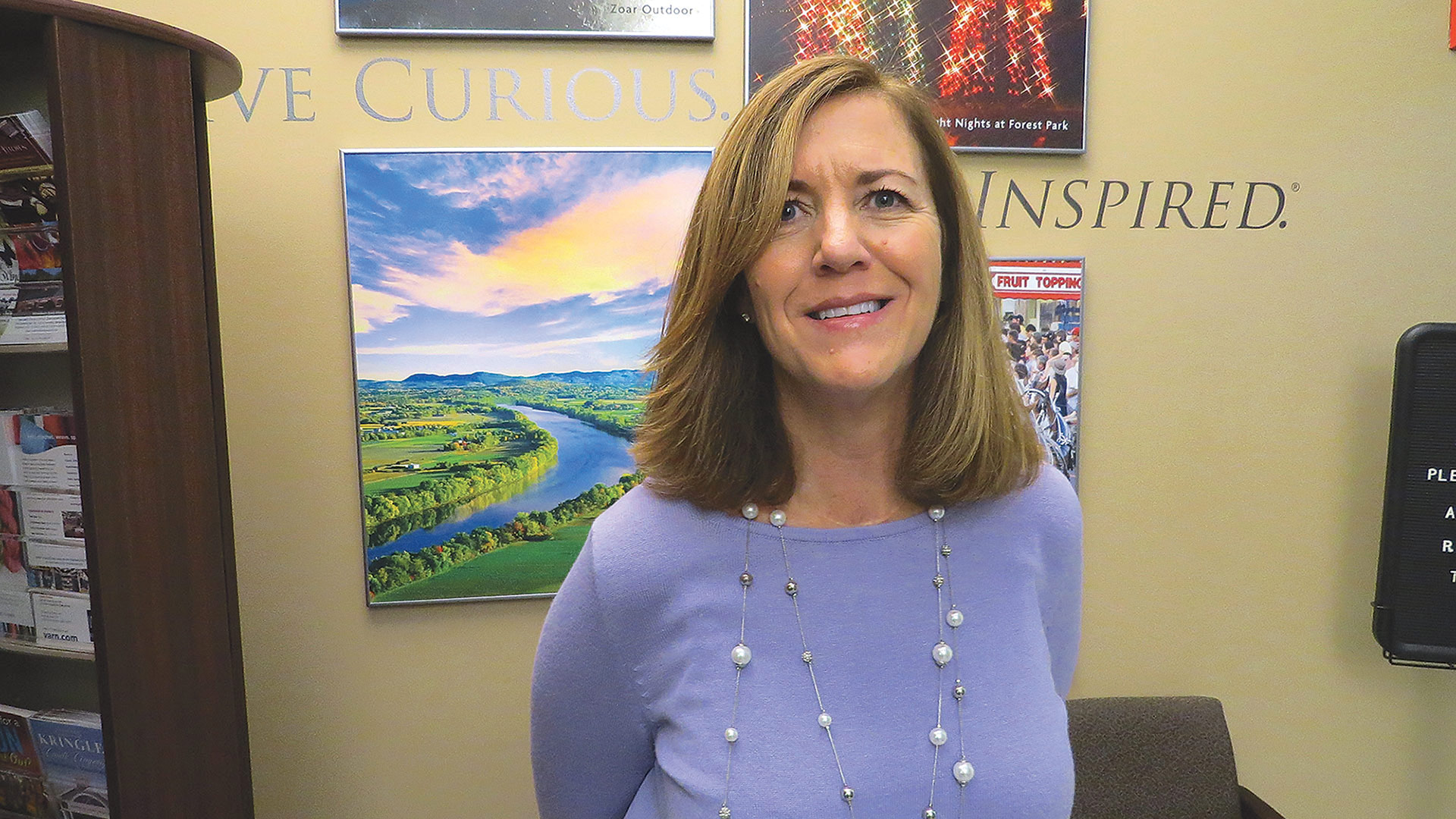
Tourism and Hospitality Industry Optimistic for 2021
Get Back Here
It’s called ‘revenge spending,’ or ‘vacation retaliation’ — the idea that people who were unable able to spend money on travel last year will go all-out this year. Surveys say it’s a palpable sentiment among Americans right now; the question is whether they will actually follow through on those plans, and how safe they’ll feel doing so. When they’re ready, area tourism and hospitality leaders say, Western Mass. will be an ideal destination, boasting the variety of indoor and outdoor experiences and affordability that travelers seek — an ideal answer to all that pent-up demand.

Gillian Amaral (left) and Stacey Warren, co-founders of Three Chics Hospitality.
Mary Kay Wydra learned a couple new phrases over the past few months.
“The buzz term is ‘revenge spending,’” the president of the Greater Springfield Convention & Visitors Bureau (GSCVB) said. “That is, ‘I’ll spend more on things I was denied because of COVID.’ Things like in-person entertainment, eating at restaurants next to people, and travel.”
The other buzzword making its way around the tourism industry is ‘vacation retaliation,’ and it means roughly the same thing.
She likes those phrases — or, more accurately, what those sentiments portend. “That bodes well for us as a region,” she told BusinessWest. “We are affordable and easily accessible — a destination with a lot to offer.”
Indeed, while COVID-19 has been far from a positive for the region, it did open many people’s eyes to what Western Mass. has to offer, particularly those who migrated here to escape New York City or Boston at the height of the pandemic. That’s evident in the surging real-estate market, but also in the optimism many in the tourism and hospitality sector are beginning to feel about what lies ahead.
It can be detected in Hampden County’s hotel occupancy, which was 39% in January — down from the 49% recorded a year earlier, but significantly higher than the statewide figure of 29%, and on par with national numbers.
“A great number of people are planning to travel, and Western Mass. is well-positioned to get summer travelers. We have that combination of indoor and outdoor attractions and all this green space for recreation.”
It’s also impacting surveys, like a recent ‘sentiment study’ conducted by American Express that found that 84% of Americans have travel plans in the next six months, the highest figure since the earliest days of the pandemic. And 69% of those intend to take advantage of ‘second-city’ destinations, Wydra noted — in other words, those outside of big cities and top tourist spots.
Places, she said, like Western Mass.
“A great number of people are planning to travel, and Western Mass. is well-positioned to get summer travelers,” she added. “We have that combination of indoor and outdoor attractions and all this green space for recreation.”
One more statistic from the survey: 61% of travelers intend to spend more than normal because they couldn’t go anywhere last year.
That’s music to the ears of Stacey Warren and Gillian Amaral, two veterans of the hospitality industry who recently launched their own enterprise, Three Chics Hospitality, which seeks to market its clients to group-tour operators.
“Our clients are group-friendly restaurants and attractions interested in having motorcoach groups come to their establishments or attractions; we offer consulting and marketing for them,” said Warren, who has worked in the hotel field for 17 years.
She called such connections “vital” to the region. “Every single bus that comes in may need 20 or 25 overnight rooms, then you have 20 to 25 dinners at different restaurants, attraction tickets … one bus is really a big impact on the economy.”
Amaral agreed. “Based on multiple tours we can bring in, the economic impact to the region will be huge,” she said. “And just based on conversations I’ve had with people, they’re ready to travel, they’re ready to get out, but they’re also ready to have someone else do that for them. People are like, ‘I just want to go on a tour; tell me where to go, make it easy for me, and take me there.’ That’s our business model. It just makes sense to be ready when the environment is ready for us.”
That moment isn’t far away, Warren added. “People are ready, and we want to be here to help the restaurants and attractions capture that business while they’re here.”
Jonathan Butler, president and CEO of 1Berkshire, noted in a message to that organization’s members last week that sentiment around travel is starting to turn in a way that promises to benefit Western Mass.
“A year ago at this time, we were headed into two or three months of lockdown where nearly all economic activity ceased. A year later, we’re mostly headed in the other direction,” he said. “Vaccinations are finally beginning to add up, public-health metrics have improved, and statewide capacity and operating restrictions continue to be eased on an almost-weekly basis. Out-of-state travelers from neighboring states are now only subject to travel advisories, and within the next couple weeks, even those should continue to be relaxed.”
Sensing a changing tide, Butler noted, organizations like Tanglewood and Jacob’s Pillow (see story on page 39) both recently announced a return to live performances for the upcoming season, and will be joined by other institutions like Barrington Stage Co., Berkshire Theatre Group, and Shakespeare and Co. in bringing performing arts — and, in turn, visitors — back to the region.
“When you combine this exciting news with the continued momentum of the outdoor recreation economy, and our other major cultural properties operating closer to full capacity — now having a year under their belt in learning how to best operate during this pandemic — 2021 starts to feel far more exciting than a year ago.”
Taking the Long View
As director of Sales for Hampton Inn Chicopee/Springfield, as well as president of Hampton Inns of New England, Warren has her finger on the pulse of hospitality in the region, as does Amaral, an assistant professor of Management at Bay Path University who also runs Events by Gillian LLC, specializing in event management and consulting, and whose past event experience includes stints at the Eastern States Exposition, MassMutual Financial Group, Enterprise Rent-A-Car, and the Basketball Hall of Fame.
The third ‘chic’ in their new enterprise’s name is, well, hospitality itself, represented by the image of a pineapple. And they feel like Western Mass. has become more of a household name in tourism and hospitality — with the potential for an even broader reach.

Mary Kay Wydra says Western Mass. is well-positioned to raise its profile in the tourism world.
“A lot of the tour operators that have been bringing groups here would just use this as a stopover because they’re from all over the country, and a lot of them just think of Boston and the Cape,” Warren said. “But they’re starting to think of Western Mass., too, and wanting to do things to add on, to offer new and fun ideas for their clients and keep them coming back.
“There are so many great things they can do right here,” she went on. “We can keep them here for a couple of days and reap the rewards, and have their clients leave here happy and wanting to come back.”
Amaral said the two of them have talked about building a business around this concept for years, and felt like this was the right time — even during a pandemic.
“We felt like there was a need. People would come to the Massachusetts area and always go straight to Boston, but what about us here in Western Mass.?” she asked. “Fast-forward to a pandemic we’re almost out of, and we thought, this is the time for us to be positioned for the influx of travel that will come with group tours.”
With their deep knowledge of the region’s tourism industry, she added, they’re able to craft itineraries tour operators can sell to clients, and it’s not too soon to start making those connections, even when the economy isn’t fully opened up.
“Every single bus that comes in may need 20 or 25 overnight rooms, then you have 20 to 25 dinners at different restaurants, attraction tickets … one bus is really a big impact on the economy.”
“Everyone is poised and ready at this point to just go — let’s hit the switch and move forward,” Amaral said. “That’s why now is the time to launch, versus in July, when things are opening up and people are feeling comfortable. At that point, you’re behind.”
Wydra agreed, noting that statistic about 84% of Americans with travel plans in the near future. “People are creating destination wish lists, and simply having a future trip planned makes people happy. We’re optimistic people are going to visit this year. We pushed pause on marketing last year, but hope to start spending again.”
She said the meeting and convention business will be slower to return, simply because large events are often planned years in advance, and an organization that cancels an event here may not be able to return for a few years. Last year, 164 groups canceled or postponed events in the region, with an estimated economic impact of $97 million going unrealized. However, about half those who canceled plan to come back in a future year, she added.
In the meantime, the GSCVB is engaging in some creative sales pitches for the region by planning virtual site visits at destinations like the Amazing World of Dr. Seuss Museum, MGM Springfield, and the Basketball Hall of Fame.
“We’re showcasing the attractions because these attractions set us apart,” she said, adding that the bureau is equally intent on highlighting the many different meeting spaces available. “We want to make sure Western Mass., as a brand, stays out there in front of meeting planners.”
Lindsey Schmid, vice president of Tourism & Marketing for 1Berkshire, recently told Berkshire Magazine about a multi-pronged marketing approach, promoting all there is to do virtually in the Berkshires, as well as continuing to feed travelers ideas and imagery that will inspire them to plan a Berkshire getaway now and more extensive travel later. Part of that message is the outdoor recreation opportunities that helped the region’s tourism sector stay afloat last summer.
It’s a widely understood selling point; U.S. News & World Report’s recent “Best States” feature ranked Massachusetts the ninth-best state in which to live, based on eight factors ranging from healthcare and education to public safely. In the category of natural environment, the Commonwealth ranked fourth.
“Our region leans on the combination of natural beauty and cultural offerings that serve as anchors to drive economic activity; right now, those anchors are preparing for big things in the summer of 2021,” Butler noted.
He added that “the pandemic has tempted us all to lean on pessimism when thinking about the future, but the progressing conditions around us truly call for more cautious optimism. We shouldn’t be so naïve as to think that the summer of 2021 will mark a return to pre-pandemic activity, but we should absolutely be preparing ourselves for a far more robust season than a year ago.”
Up in the Air
Certainly, optimism is in the air, although it’s still mixed with some uncertainty. Gathering limits are still a thing, most live performances remain firmly lodged in the future, and some attractions have given no definitive answers on when they’ll open, and to what extent.
For instance, Six Flags New England held a large hiring event last month to fill 3,000 seasonal positions, but the company has issued no definite opening date yet — though it is expected to decide soon, looking to state guidance and the realities of its own business model.
It will do so with heavily publicized safety protocols, like every other tourist destination — an element of the sector Wydra is particularly proud of.
“We’re climbing out of this with precautions still in place,” she said. “I’m very proud of our attractions, with all the protocols put in place, the cleaning and everything else they’re doing to keep visitors safe. You’ll see a lot of that continue.”
Warren said visitors will want to feel safe before the sector really opens up. “There are still some people who are nervous, but we’re able to show them what we can do — what plans the restaurants and attractions have in place to keep them safe when they come — and that’s making them feel very comfortable and ready to visit.”
Amaral cited research showing that people are more comfortable and apt to travel when adequate protocols are in place.
“Being knowledgeable about what to expect ahead of time puts them at ease,” she added. “And, of course, so many people being vaccinated is helping as well. The apprehension, even from six months ago, is much different than it is now. People are just ready to go — with caution, but nonetheless, they’re saying, ‘let’s go.’”
Wydra agreed. “There’s definitely some optimism as we move forward with the vaccines. We’re always hearing about new ones being introduced, and the government keeps making people eligible for it — that’s great news.”
Butler tempered that optimism with the other side of pandemic reality — which is, we’re not out of it yet, and people shouldn’t just abandon the common-sense behaviors that keep case counts down.
“Any increase in business needs to be done with public health and safety as the foremost consideration,” he said. “But all of the larger-picture conditions that have fueled growing visitor and economic activity throughout the past two decades are aligning well.”
Warren has been in the hospitality field long enough to ride a few economic cycles, but she’s never witnessed anything like last year — “and I never want to see it again,” she said. “I’ve never had to cancel so many groups and lose literally millions of dollars in revenue. So I’m looking forward to coming back strong this year and help everyone to bounce back.”
She’s heard from tour operators that they do, indeed, want to come back. But they’ll be returning to a changed tourist economy, and change isn’t always a bad thing, Amaral said.
“This has been a wake-up call to most businesses to think differently, which is exciting to me. Let’s not wait for a pandemic or tragedy to happen to think about a different way to do business or attract a target market or a different product line. If there’s anything we can take from this, it’s don’t get into the same rut. Think about different ways to improve your business.”
Amid the changes, of course, some normalcy is more than welcome.
“Who would have thought, a year ago, that we couldn’t go into a bar and have a drink?” Wydra said. “I want to meet friends after work for drinks. And I’m excited, because I think we’ve got some positive stuff happening in the future.”
Joseph Bednar can be reached at [email protected]




